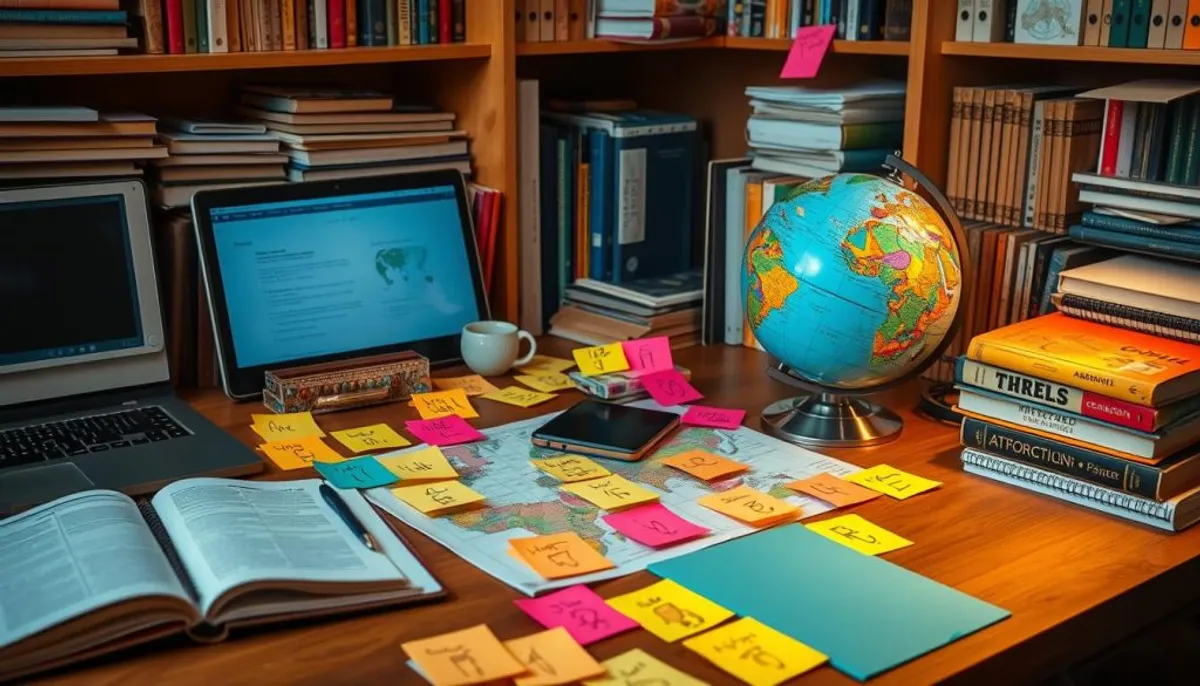The general knowledge plays a crucial role in numerous competitions and exams in France. It allows for the evaluation of candidates' intellectual curiosity and analytical skills. A rigorous preparation is therefore essential to succeed in these complex tests.
General knowledge tests are present in various competitions, such as the Public Service, HEC Preparatory Classes, and certain BTS programs. To excel, it is essential to adopt a structured strategy. This involves broadening one's knowledge, mastering writing techniques, and staying updated with current events.

The preparation requires an investment of time and method. It is advisable to dedicate eight to nine months to written preparation and up to a year for the oral exam. A well-structured revision plan covering various areas such as art, literature, history, and economics is essential for thorough preparation.
The formats of the tests vary: MCQ, essays, summary notes, or oral exams. Each type requires a specific approach. For example, the essay is evaluated based on reflection, argumentation, and writing quality. Therefore, it is crucial to practice these exercises regularly to make progress.
The fundamentals of general knowledge for competitions
General knowledge is fundamental in many competitions. It is often valued with a high coefficient, between 5 and 6. To excel, it is crucial to master various aspects and types of tests.
The different types of general knowledge tests
Candidates may be subjected to several forms of evaluation:
- MCQ: multiple-choice questions
- Essay: structured writing on a given topic
- Summary note: analytical summary of documents
- Oral exam: presentation and Q&A

The essential areas of knowledge
Adequate preparation must cover a wide range of subjects:
- History and geography
- Literature and philosophy
- Economics and current events
- Arts and sciences
Examiners value varied references, especially in literature, philosophy, and the arts.
Examiner expectations
Examiners look for:
- A mastery of the language without syntax or lexical errors
- The ability to conceptualize and develop arguments
- A reflection that goes beyond the theme of the year, without being off-topic
- An ability to address metaphorical or counter-intuitive subjects (appreciated by HEC)
A rigorous preparation and an understanding of expectations are crucial for success in these tests.
How to prepare for a general knowledge test
Preparing for a general knowledge test requires meticulous organization and precise planning. A well-thought-out work strategy is crucial to excel at this essential stage.
Establishing a structured revision schedule
Optimize your revisions by creating a detailed schedule. Allocate 2 hours and 30 minutes to synthesis and 1 hour and 30 minutes to personal writing. Don't forget 5 minutes for the final proofreading. Here is an example of a daily schedule:
| Time | Activity | Duration |
|---|---|---|
| 8am – 10:30am | Document synthesis | 2h30 |
| 10:30am – 12pm | Personal writing | 1h30 |
| 12pm – 12:05pm | Final proofreading | 5 min |
Organizing your documentary resources
Organizing your resources is essential. Invest in general knowledge books. Explore areas such as philosophy, literature, and economics. MOOCs and online lectures enrich your knowledge.
Establishing a learning routine
Create a daily learning routine. Follow legal news and developments in jurisprudence. Participating in cultural activities develops your sensitivity and understanding of the world. This approach will effectively prepare you for the general knowledge test.
Effective methods for cultural enrichment
Cultural enrichment is crucial for excelling in general knowledge tests. Reading is the cornerstone of this enrichment. Books, newspapers, and magazines are sources of diverse information. Additionally, television and radio enhance this learning through their dynamism.
Educational games offer a playful approach to assimilating knowledge. Games like Trivial Pursuit or cultural mobile apps make learning not only fun but also effective. These tools promote the memorization of facts interactively.

Internet is a treasure trove for deepening one's culture. Cultural podcasts, educational YouTube channels, and thematic forums are inexhaustible resources. These platforms offer varied content suited to all levels.
| Method | Advantages | Examples |
|---|---|---|
| Reading | Deepens knowledge | Books, press, novels |
| Audiovisual media | Dynamic learning | Documentaries, cultural shows |
| Educational games | Playful learning | Trivial Pursuit, mobile apps |
| Online resources | Easy access to information | Podcasts, YouTube channels, forums |
The combination of these methods ensures varied and effective cultural enrichment. The key lies in the regularity and diversity of the sources consulted. Thus, everyone can find the method that suits them best to broaden their knowledge.
The importance of daily information monitoring
Information monitoring is essential for preparing for general knowledge tests. It ensures a constant update on current events. Thus, it continuously enriches our knowledge.
Active reading of the press
The online press is a goldmine of information. It is advisable to dedicate at least 20 minutes a day to reading national newspapers. Le Monde and Les Échos are good choices. This habit improves our understanding of social, economic, and political issues.
Following digital media
Digital media offer a variety of formats for staying informed. News sites, podcasts, and specialized YouTube channels complement traditional press. The Conversation, for example, provides detailed analyses on various current topics.
Using cultural social networks
Social networks, such as Twitter and Facebook, are essential tools for monitoring. By following official accounts of media and experts, one quickly accesses a variety of perspectives on current events.
| Monitoring tool | Features | Advantages |
|---|---|---|
| Feedly | RSS feed aggregator | Chronological presentation of content |
| Selection algorithm | Pre-selection of relevant sources | |
| Netvibes | Customizable dashboards | Centralization of varied feeds |
By adopting these monitoring practices, candidates improve their chances of success. Statistics show that 96% of students enter the best schools thanks to rigorous preparation. This preparation includes effective information monitoring.
Memorization and organization techniques
To excel in a general knowledge test, it is imperative to master memorization and organization methods. These strategies will allow you to structure and retain your knowledge more effectively.
Creating thematic revision notes
Revision notes are an essential tool for condensing information. It is recommended to limit oneself to about ten major themes to avoid overload. Organize them by areas, such as history, geography, or sciences. This strategy simplifies memorization and facilitates quick revision before the test.
The mind-mapping method
Mind-mapping is an effective visual technique for linking concepts. Create mind maps for each key theme. Place the main topic in the center and add branches for related ideas. This method stimulates creativity and strengthens the links between different notions, thus improving your overall understanding.
Practical memorization exercises
Regular mental training is crucial to solidify your knowledge. Use quiz apps on your smartphone to test your knowledge daily. Revising in small groups of 2 to 3 people can also be beneficial. It allows for exchanging viewpoints and stimulating your thinking, thus enriching your preparation for the general knowledge test.
RelatedRelated articles


